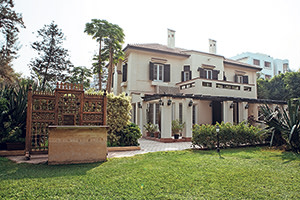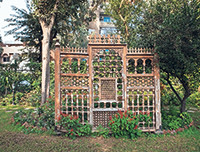Lisa Anderson on her strategy for the American University in Cairo

Roula Khalaf, Editor of the FT, selects her favourite stories in this weekly newsletter.
As a scholar, Lisa Anderson spent decades studying, debating and teaching tribalism and politics in the Arab world. Her academic pursuits took her to countries such as Libya and Egypt, where modern bureaucracies and political parties rose amid age-old prejudices and long-entrenched social relations.
Over the past three years she has found herself carefully navigating those very shoals herself as president of the American University in Cairo at a time of tumultuous change in Egypt. Throughout this period she has split her time between the university campus and a two-storey mission-style bungalow – owned by the AUC – she shares with her partner, Marc Rauch, in the upscale suburb of Maadi.
Since the 2011 uprising against Hosni Mubarak, which erupted just days after Anderson assumed the presidency of Egypt’s most prestigious institution of higher education, she has grappled with a long series of campus crises. Disputes broke out with both the university’s 3,500 faculty, maintenance crew and support staff demanding more rights and 7,000 students occasionally attempting to bring the defiant attitudes of Cairo’s streets into classrooms and lecture halls. Security worries whittled the number of foreign students at the school from about 500 to 30, and drove home almost all Americans studying at the school.
“The things that happened throughout Egypt happened to us, too,” says Anderson, a 63-year-old American political scientist and native of Long Island, New York. “All we needed was bloody pictures of AUC students on the front page of the New York Times and we’d be done, we’d be finished.”
Fortunately for her students, Anderson already had experience overseeing a school at a time of crisis. She was dean at Columbia University’s School of International and Public Affairs during the 9/11 attacks on the World Trade Center. That experience taught her to encourage teachers to welcome debates, even if they strayed from the curricula. “Some of the political science and history courses assigned things the students had written as they rose as activists and bloggers,” she says. “It was just so interesting in terms of authority – who was the student and who was the teacher?”

When she accepted her current position, Anderson was able to convince AUC’s elders to allow her keep the same elegant home she had lived in for three years as the school’s provost for academic affairs instead of forcing her to move to closer to work at the new campus on the capital’s eastern outskirts. The house, though surrounded by a forest of newly built towers, is set amid a verdant one-acre garden, which offers her a welcome space for reflection away from the tumult.
The dimly lit halls of the three-bedroom 1930s mission-style building are filled with artwork and furniture she has collected, as well as paintings and furnishings that belong to the university.
One work, made by her sister-in-law, is a collage of patterns from the inside of old envelopes assembled into a map of the Mediterranean, Europe and the Middle East. “Envelopes have security linings so you can’t see through them,” says Anderson. “She is making a statement about security in the region. But the nice thing is that you don’t need to know the concept to just think it’s pretty.”

For the dining room, Anderson took inexpensive light fixtures from a Cairo market and converted them into an elegant chandelier in a style that matches the Ottomanesque table and chairs. “We had seen something like this that had cost literally thousands of dollars,” she says. “So we said, ‘That’s silly. We’ll do it ourselves’.”
Upstairs, her bedroom drawers are filled with hundreds of colourful scarves she has amassed over the years. It is important, she says, for everyone to collect something, so friends and relatives will know what gift to get come the holidays. “The scarf in the imagination of western women is loaded, a kind of cynical symbol of oppression,” she says. “But it’s not. It’s joy. It’s decoration and fun. And as women, we all share and enjoy scarves.”
The centrepiece of the house is the second-floor office, which opens on to a large balcony with a majestic view of the garden. “The grounds had been neglected for some time,” she says during a tour of the garden, which includes orange and mango trees. “We have a gardener who is pretty ambitious and likes to get creative. There are always lots of flowers. I don’t entertain inside unless I really have to; everything is outside all the time and that’s one of the joys of living in this climate.”

The house was built at a time when European expatriates and wealthy Egyptians moved to Maadi to get away from Cairo’s congestion. That era came to an end in the 1950s and 1960s, with the toppling of western-installed monarchies, the unravelling of the social order they represented and the rise of socialist-tinged nationalism across the Arab world. Many of Egypt’s Greek and Italian elite were driven out of the country. Leaders such as Egypt’s Gamal Abdel Nasser, Libya’s Muammer Gaddafi and Syria’s Hafez Assad imposed populist military rule in an effort to modernise.
It was in the early 1970s that Anderson, then an undergraduate at Sarah Lawrence College in New York, almost accidentally became interested in the Arab world, with a focus on Libya just because of the dearth of material on it. Coincidentally, one of her classmates at Tufts University, where she studied for her Master’s degree, was Shokri Ghanem, who later became Libya’s oil minister and prime minister. Over coffee with Ghanem, she learnt about Libya, a country she managed to explore during several lengthy visits.

The 1970s were a tumultuous time in the Arab world, when nations were breaking off relations with the US over its support for Israel. Anderson found that events in the 19th and early 20th centuries had a far deeper impact on the countries she was studying. Whereas colonial powers in states such as Tunisia and Egypt weakened and broke age-old tribal affiliations, others like the Italians in Libya or Britons in Iraq and Jordan ended up strengthening the tribes.
Anderson experienced first-hand the fits and starts of Egypt’s changing political climate. During stand-offs with students demanding lower tuition fees in 2011 and 2012, she found herself confronting occasionally reckless campus leaders seeking to make names for themselves on social media while preventing other students from attending classes.
“In the west, you know who is going on strike and who their leadership is and what their role is, and you know what their demand is and it goes back and forth,” she says. “No one had ever done that here.”
Eventually, she asked a Canadian member of her staff to serve as an adviser to the university’s makeshift labour unions, urging them to sharpen and distil their demands as the basis for negotiations.
At first there were fears on both sides, but over the months, trust was established, based mostly on personal relations. For now, it works, but Anderson realises that it is flawed and rooted in the same kind of traditional forms of social organisation that keep the region behind. There is still a long way to go before Egyptians begin to have faith in their own institutions. “Moving trust from trusting individuals to trusting institutions and procedures is not an easy thing,” she says. “In the long run you want to trust the institution.”
Borzou Daragahi is the FT’s Middle East and north Africa correspondent
——————————————-
Favourite thing

No one quite knew the provenance of the two intricately crafted latticework wooden screens – constructed in the mashrabiya style common in mosques – that were found lying in the backyard of the house. Anderson fell in love with them and discovered they once belonged to Hoda Shaarawi, the Egyptian feminist and nationalist leader who died in 1947“Somehow AUC came to possess the screens,” says Anderson. “And we had them restored . . . Nobody knows what they meant to Hoda Sharawi, or where she would have wanted them, but we all think they are beautiful.”
Comments